延续性动词与非延续性动词-总结(含练习)
延续性动词与非延续性动词总结

延续性动词与非延续性动词总结1. to be(是,存在):I am studying.(我正在学习。
)2. to live(居住):She lives in New York.(她住在纽约。
)3. to work(工作):He is working late tonight.(他今晚要工作到很晚。
)4. to study(学习):They have been studying for hours.(他们已经学习了几个小时了。
)5. to run(跑):He has been running for 30 minutes.(他已经跑了30分钟了。
)非延续性动词:1. to eat(吃):They ate dinner together.(他们一起吃饭了。
)2. to jump(跳跃):The kids jumped on the trampoline.(孩子们在蹦床上跳跃。
)3. to smile(微笑):She smiled at her friend.(她对朋友微笑。
)4. to laugh(笑):They laughed at the funny joke.(他们笑了个不停,笑了个肚子疼。
)5. to sneeze(打喷嚏):He sneezed because of the dust.(他因为灰尘打了个喷嚏。
)需要注意的是,并不是所有动词都严格属于延续性动词或非延续性动词,有些动词的延续性取决于上下文和语境。
因此,在使用动词的时候需要根据具体情况来确定是否使用延续性动词还是非延续性动词。
练习延续性和非延续性动词的用法
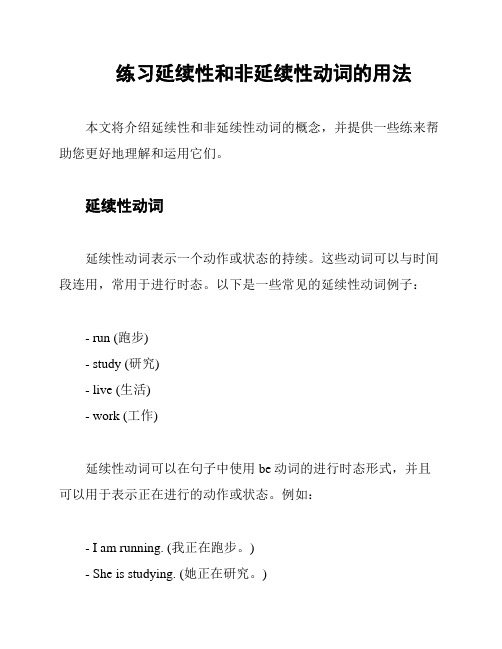
练习延续性和非延续性动词的用法本文将介绍延续性和非延续性动词的概念,并提供一些练来帮助您更好地理解和运用它们。
延续性动词延续性动词表示一个动作或状态的持续。
这些动词可以与时间段连用,常用于进行时态。
以下是一些常见的延续性动词例子:- run (跑步)- study (研究)- live (生活)- work (工作)延续性动词可以在句子中使用be动词的进行时态形式,并且可以用于表示正在进行的动作或状态。
例如:- I am running. (我正在跑步。
)- She is studying. (她正在研究。
)- They are living in London. (他们住在伦敦。
)- We are working on a project. (我们正在进行一个项目。
)非延续性动词非延续性动词表示一个动作或状态的短暂性或瞬时性。
这些动词不可以与时间段连用,常用于一般时态。
以下是一些常见的非延续性动词例子:- eat (吃)- drink (喝)- sleep (睡觉)- arrive (到达)非延续性动词不能用于进行时态,因为它们表示的动作或状态是瞬时的。
例如:- I ate breakfast this morning. (我今早吃了早餐。
)- She drank a glass of water. (她喝了一杯水。
)- He slept for eight hours. (他睡了八个小时。
)- They arrived at the airport on time. (他们准时到达了机场。
)练请根据下列句子中的动词判断它们是延续性动词还是非延续性动词,并将正确的选项填入括号中:1. We (are/is) playing basketball in the park.2. He (ate/eats) dinner at a restaurant yesterday.3. They (are/is) swimming in the pool.4. She (sleeps/slept) for twelve hours last night.5. I (am/ate) an apple for a snack.答案:1. are2. ate3. are4. slept5. ate总结延续性动词表示一个动作或状态的持续,可以用于进行时态;非延续性动词表示一个动作或状态的短暂性或瞬时性,不能用于进行时态。
延续性动词和非延续性动词
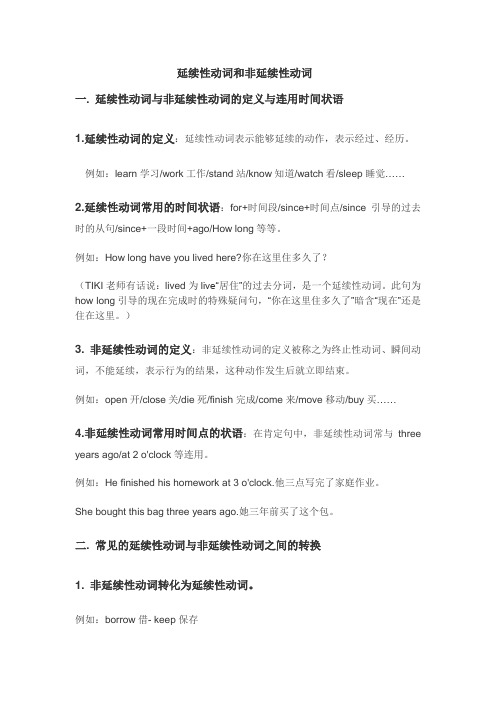
延续性动词和非延续性动词一. 延续性动词与非延续性动词的定义与连用时间状语1.延续性动词的定义:延续性动词表示能够延续的动作,表示经过、经历。
例如:learn学习/work工作/stand站/know知道/watch看/sleep睡觉……2.延续性动词常用的时间状语:for+时间段/since+时间点/since引导的过去时的从句/since+一段时间+ago/How long等等。
例如:How long have you lived here?你在这里住多久了?(TIKI老师有话说:lived为live“居住”的过去分词,是一个延续性动词。
此句为how long引导的现在完成时的特殊疑问句,“你在这里住多久了”暗含“现在”还是住在这里。
)3. 非延续性动词的定义:非延续性动词的定义被称之为终止性动词、瞬间动词,不能延续,表示行为的结果,这种动作发生后就立即结束。
例如:open开/close关/die死/finish完成/come来/move移动/buy买……4.非延续性动词常用时间点的状语:在肯定句中,非延续性动词常与three years ago/at 2 o'clock等连用。
例如:He finished his homework at 3 o'clock.他三点写完了家庭作业。
She bought this bag three years ago.她三年前买了这个包。
二. 常见的延续性动词与非延续性动词之间的转换1. 非延续性动词转化为延续性动词。
例如:borrow借- keep保存buy买- have拥有catch a cold患上感冒- have a cold感冒put on穿上(强调动作)- wear穿上(强调状态)get to know ----- know2. 非延续性动词转化为“be+形容词/副词/介词/名词等”。
例如:start/begin--- be on 开始go out--- be out出去finish--- be over完成get to/arrive in/reach--- be(in)到达die--- be died死open--- be open开leave--- be away离开come/go-- - be+相应的介词fall ill--- be ill生病get up--- be up起床fall asleep--- be asleep睡觉join--- be in/be a member of参加go to school--- be in school 去学校become--- be成为make friends--- be friends交朋友。
延续性与非延续性动词在现在完成时态中的使用

延续性与非延续性动词在现在完成时态中的使用
延续性动词和非延续性动词在现在完成时态中的使用有一些区别。
1.延续性动词:
延续性动词表示持续的动作或状态,常见的有live(住)、work
(工作)、study(学习)、wait(等待)等。
在现在完成时态中,延续
性动词通常用来表示一个动作或状态开始于过去,持续到现在,并且可能
会继续下去。
例如:
- I have lived in this city for 10 years.(我在这个城市住了
10年了。
)
2.非延续性动词:
非延续性动词表示瞬间动作或不可数的状态,常见的有arrive(到达)、die(死亡)、finish(完成)、know(知道)等。
在现在完成时
态中,非延续性动词通常用来表示一个动作已经完成或一个状态已经发生,没有持续的时间。
例如:
- She has arrived at the airport.(她已经到达了机场。
)
- The project has finished.(项目已经完成了。
)
- I have known him since childhood.(我从小就认识他了。
)
需要注意的是,有些动词既可以是延续性动词,也可以是非延续性动词,根据上下文来决定其使用方式。
比如,动词sleep(睡觉)可以是延
续性动词,表示持续的睡眠状态,也可以是非延续性动词,表示一次性的睡眠动作。
延续非延续性动词

1. 以when和while引导的时间状语从句
动词其中的一种分类
1) 延续性动词和非延续性动词
延续性动词指动作可以延续一段时间, 而不是
瞬间结束。如: work、study、drink、stay、read等。 用过去进行时 例:I was reading at six last night.
2) 非延续性动词(瞬时动词)指动作极为短暂,瞬间结束。
3. A did while B was doing
Jim came in while Kate was watching TV.
【 2013 浙江杭州】 Sally took a photo of her friends while they ____ D computer games. A. play B. are playing C. have played D. were playing 【 2013 黑龙江绥化】 My uncle ____ C books in the room at this time yesterday. A. was seeing B. is reading C. was reading 【2013黑龙江齐齐哈尔3】What _C ___ you _____ when the captain came in? A. are; doing B. did; do C. were; doing
1. A was doing when B did Jim was reading when the teacher came in. 2. A was doing while B was doing Jim was reading while Kate was watching TV.
现在完成时中延续性动词和非延续性动词
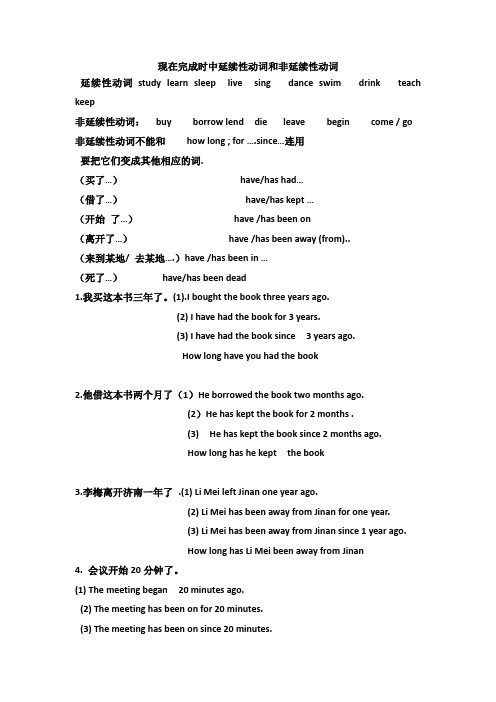
现在完成时中延续性动词和非延续性动词延续性动词study learn sleep live sing dance swim drink teach keep非延续性动词:buy borrow lend die leave begin come / go 非延续性动词不能和how long ; for ….since…连用要把它们变成其他相应的词.(买了…)have/has had…(借了…)have/has kept …(开始了…)have /has been on(离开了…)have /has been away (from)..(来到某地/ 去某地….)have /has been in …(死了…)have/has been dead1.我买这本书三年了。
(1).I bought the book three years ago.(2) I have had the book for 3 years.(3) I have had the book since 3 years ago.How long have you had the book2.他借这本书两个月了(1)He borrowed the book two months ago.(2)He has kept the book for 2 months .(3) He has kept the book since 2 months ago.How long has he kept the book3.李梅离开济南一年了.(1) Li Mei left Jinan one year ago.(2) Li Mei has been away from Jinan for one year.(3) Li Mei has been away from Jinan since 1 year ago.How long has Li Mei been away from Jinan4. 会议开始20分钟了。
完整版)延续性动词和非延续动词转换和练习(精华)

完整版)延续性动词和非延续动词转换和练习(精华)本文讲述了终止性动词与延续性动词之间的转换。
终止性动词指的是动作的发生与结束于一瞬间完成,无法再延续。
因此,现在完成时不能与表示延续的时间状语连用,也不能用在how long引导的特殊疑问句中。
如果需要表示持续,可以将时间状语改为时间段+ ago,谓语动词用一般过去时;或者将终止性动词改为相应的状态动词或延续性动词。
在实际应用中,常见的短暂性动词与延续性动词的转换包括be型和实义动词型。
例如,go there可以转换为be there,come here可以转换为be here,finish/end可以转换为be over,get married可以转换为be married等等。
这些转换可以帮助我们更准确地表达动作的状态和持续时间。
1.Borrowing means temporarily taking something from someone else。
while keeping something means having n of it permanently。
Similarly。
buying something means acquiring it for good。
while having something means already possessing it。
2.Instead of saying "begin to teach," we can simply say "teach."3.Getting to know someone means ing acquainted with them。
while knowing someone means already having a nship with them。
4.Putting on clothes means dressing oneself。
现在完成时中延续性动词和非延续性动词
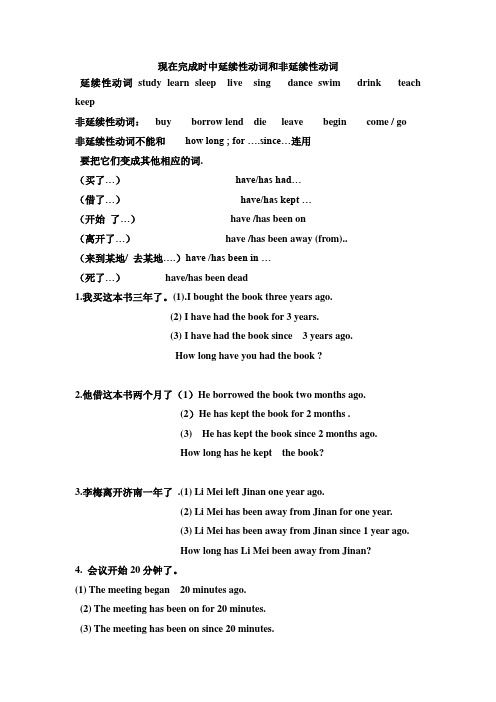
现在完成时中延续性动词和非延续性动词延续性动词study learn sleep live sing dance swim drink teach keep非延续性动词:buy borrow lend die leave begin come / go非延续性动词不能和how long ; for ….since…连用要把它们变成其他相应的词.(买了…)have/has had…(借了…)have/has kept …(开始了…)have /has been on(离开了…)have /has been away (from)..(来到某地/ 去某地….)have /has been in …(死了…)have/has been dead1.我买这本书三年了。
(1).I bought the book three years ago.(2) I have had the book for 3 years.(3) I have had the book since 3 years ago.How long have you had the book ?2.他借这本书两个月了(1)He borrowed the book two months ago.(2)He has kept the book for 2 months .(3) He has kept the book since 2 months ago.How long has he kept the book?3.李梅离开济南一年了.(1) Li Mei left Jinan one year ago.(2) Li Mei has been away from Jinan for one year.(3) Li Mei has been away from Jinan since 1 year ago.How long has Li Mei been away from Jinan?4. 会议开始20分钟了。
延续性动词和非延续性动词

延续性动词和⾮延续性动词⼀.延续性动词和⾮延续性动词:㈠延续性动词:表⽰⼀种可以持续的⾏为过程或状态。
drink喝have有talk说know 知道stand站⽴sleep睡觉sing唱歌wait等wear穿walk⾛work⼯作rain下⾬keep保持snow 下雪eat 吃read读play玩live 居住smoke 抽烟lie躺着stay保持㈡终⽌性动词:(⾮延续性动词),表⽰⾏为或者动作是短暂瞬间完成的。
come来fall倒borrow借admit承认break打破start开始join加⼊buy买jump跳lose丢open打开close关stop结束begin开始go⾛put 放die死hit击中leave离开arrive到达marry结婚㈢两者的⽤法和区别:1.延续性动词可以⽤表⽰⼀段时间的状语修饰,⾮延续动词不可⽤。
How long can I keep the book.这本书我可以借多久?They will work here till next Friday.她们要在这⾥⼯作到下周五。
2.有时,⾮延续性动词也可以与表⽰⼀段时间的时间状语搭配,但这种表⽰⼀段时间的状语,实质上是表⽰⼀段时间内的某个时间“点”。
The play will start in half an hour.这出戏半个⼩时后开始。
The fire broke out during the night.⽕是夜间发⽣的。
3.⾮延续性动词⼀般不⽤于while引导的时间状语从句中。
While I came home, he was cooking dinner. (错)When I came home, he was cooking dinner. (对)4.⽤延续性动词表⽰⼀时的动作,可以在该动词前加get/begin/come.When did you get to know him?你什么时候认识他的?They begin to see that they had made a serious mistake.她们开始认识到⾃⼰犯了⼀个⼤错。
现在完成时中延续性动词和非延续性动词

现在完成时中延续性动词和非延续性动词延续性动词study learn sleep live sing dance swim drink teach keep非延续性动词:buy borrow lend die leave begin come / go非延续性动词不能和how long ; for ….since…连用要把它们变成其他相应的词.(买了…)have/has had…(借了…)have/has kept …(开始了…)have /has been on(离开了…)have /has been away (from)..(来到某地/ 去某地….)have /has been in …(死了…)have/has been dead1.我买这本书三年了。
(1).I bought the book three years ago.(2) I have had the book for 3 years.(3) I have had the book since 3 years ago.How long have you had the book ?2.他借这本书两个月了(1)He borrowed the book two months ago.(2)He has kept the book for 2 months .(3) He has kept the book since 2 months ago.How long has he kept the book?3.李梅离开济南一年了.(1) Li Mei left Jinan one year ago.(2) Li Mei has been away from Jinan for one year.(3) Li Mei has been away from Jinan since 1 year ago.How long has Li Mei been away from Jinan?4. 会议开始20分钟了。
延续性动词与非延续性动词用法攻略
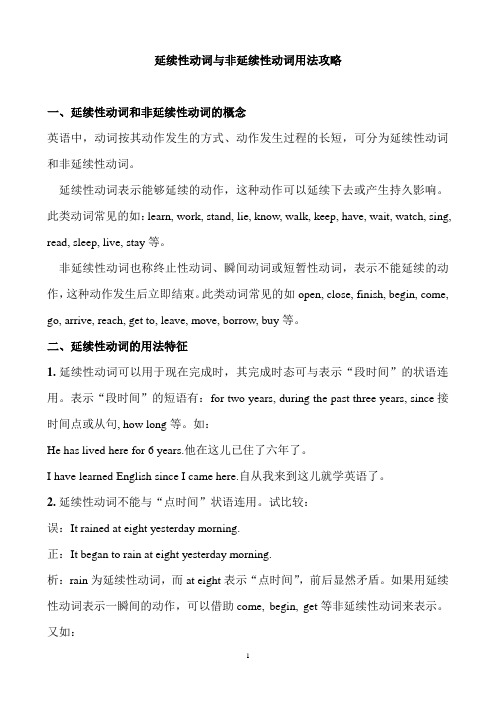
延续性动词与非延续性动词用法攻略一、延续性动词和非延续性动词的概念英语中,动词按其动作发生的方式、动作发生过程的长短,可分为延续性动词和非延续性动词。
延续性动词表示能够延续的动作,这种动作可以延续下去或产生持久影响。
此类动词常见的如:learn, work, stand, lie, know, walk, keep, have, wait, watch, sing, read, sleep, live, stay等。
非延续性动词也称终止性动词、瞬间动词或短暂性动词,表示不能延续的动作,这种动作发生后立即结束。
此类动词常见的如open, close, finish, begin, come, go, arrive, reach, get to, leave, move, borrow, buy等。
二、延续性动词的用法特征1.延续性动词可以用于现在完成时,其完成时态可与表示“段时间”的状语连用。
表示“段时间”的短语有:for two years, during the past three years, since接时间点或从句, how long等。
如:He has lived here for 6 years.他在这儿已住了六年了。
I have learned English since I came here.自从我来到这儿就学英语了。
2.延续性动词不能与“点时间”状语连用。
试比较:误:It rained at eight yesterday morning.正:It began to rain at eight yesterday morning.析:rain为延续性动词,而at eight表示“点时间”,前后显然矛盾。
如果用延续性动词表示一瞬间的动作,可以借助come, begin, get等非延续性动词来表示。
又如:--When did you get to know Jack?你什么时候认识杰克的?--Two years ago.两年前。
初中英语延续性动词与非延续性动词

如何变换:
Come- be here
Go –
be there leave→ be away, borrow→ keep, buy→ have, begin/start → be on, die→ be dead, move to→ live in, finish→ be over, join→ be in/be a member of,
open sth.→ keep sth. open, feel ill→ be ill, get up→ be up,
become --- be,
come back --- be back,
fall asleep --- be asleep, get to/ arrive/reach --- be (in), leave --- be away from, get to know --- know,
16.The bus ______ on the road for 2 hours so far. A. has stopped B. stopped C. has been 17.Are you _____ the jacket these days? A. wearing
go (get) out →be out,
put on→ wear;
初中英语语法 延续性动词与非延续性动词专项训练
1.
√
When he arrived at the bus stop, the bus ________ for 20 minutes. A. has left B. had left C. has been away D. had been away 2. I ______ the League for 5 years so far. A. joined B. have joined C. have been in 3. The factory ________ since the February of 1988. A . has been open B. has opened C. was open D. opened 4. Mary and Rose _______friends since they met in 2000. A. have made B. have been C. made D. have become 5.You mustn't ________ until he comes back. A. be away B. leave C. be left
英语延续性与非延续性动词总结与练习
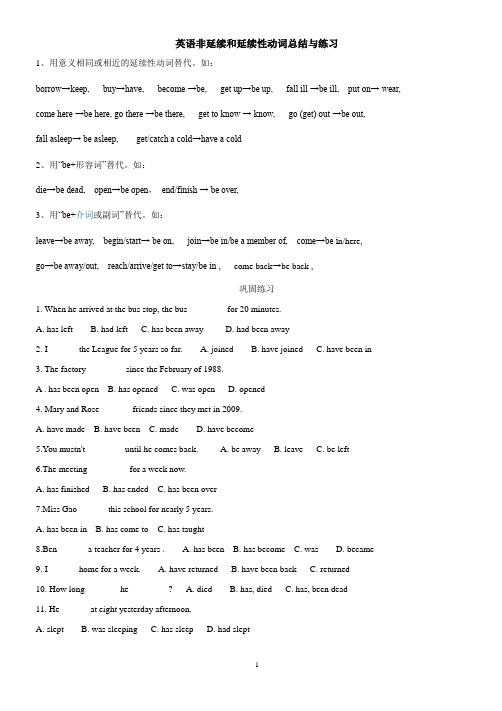
1、用意义相同或相近的延续性动词替代。
如:borrow→keep, buy→have, become →be, get up→be up, fall ill →be ill, put on→ wear, come here →be here, go there →be there,get to know → know, go (get) out →be out,fall asleep→ be asleep, get/catch a cold→have a cold2、用“be+形容词”替代。
如:die→be dead, open→be open,end/finish → be over,3、用“be+介词或副词”替代。
如:leave→be away,begin/start→ be on, join→be in/be a member of, come→be i n/here,go→be away/out, reach/arrive/get to→stay/be in , come back→be back ,巩固练习1. When he arrived at the bus stop, the bus ________ for 20 minutes.A. has leftB. had leftC. has been awayD. had been away2. I ______ the League for 5 years so far. A. joined B. have joined C. have been in3. The factory ________ since the February of 1988.A . has been open B. has opened C. was open D. opened4. Mary and Rose _______friends since they met in 2009.A. have madeB. have beenC. madeD. have become5.You mustn't ________ until he comes back. A. be away B. leave C. be left6.The meeting _______ for a week now.A. has finishedB. has endedC. has been over7.Miss Gao ______ this school for nearly 5 years.A. has been inB. has come toC. has taught8.Ben ______ a teacher for 4 years . A. has been B. has become C. was D. became9. I ______ home for a week. A. have returned B. have been back C. returned10. How long _______ he ________ ? A. died B. has, died C. has, been dead11. He ______ at eight yesterday afternoon.A. sleptB. was sleepingC. has sleepD. had slept12.He ________ the car for a week.A. boughtB. has boughtC. has had13.-----How long _____ you _____ ill ? -----Two weeks.A. did fallB. have, fellC. have, been14.Since 2009, he _____ his hometown.A. has leftB. has moved awayC. has been away from15.I'll lend you the book , but you can only _____ it for 2 days.A. borrowB. keepC. take16.The bus ______ on the road for 2 hours so far.A. has stoppedB. stoppedC. has been17.Are you _____ the jacket these days?A. wearingB. putting onC. dressingD. on18.He ________ for 2 hours. A. got up B. has got up C. has been up19. Tom is ill in hospital. He _______ a cold for several days.A. isB. catchesC. has caughtD. has had20.----- How long can I ______ the book? ------ Two weeks.A. borrowB. lendC. getD. Keep21.---How long have you ________ the book? ---Two weeks.A. boughtB. lentC. hadD. Borrowed22. ---Do you know him well?---Sure, we________friends for ten years.A. wereB. have beenC. have becomeD. have made。
延续性动词与非延续性动词
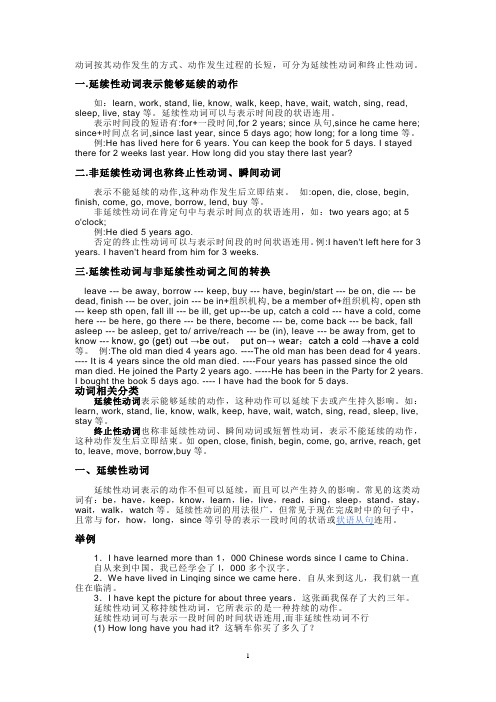
动词按其动作发生的方式、动作发生过程的长短,可分为延续性动词和终止性动词。
一.延续性动词表示能够延续的动作如:learn, work, stand, lie, know, walk, keep, have, wait, watch, sing, read, sleep, live, stay等。
延续性动词可以与表示时间段的状语连用。
表示时间段的短语有:for+一段时间,for 2 years; since从句,since he came here; since+时间点名词,since last year, since 5 days ago; how long; for a long time等。
例:He has lived here for 6 years. You can keep the book for 5 days. I stayed there for 2 weeks last year. How long did you stay there last year?二.非延续性动词也称终止性动词、瞬间动词表示不能延续的动作,这种动作发生后立即结束。
如:open, die, close, begin, finish, come, go, move, borrow, lend, buy等。
非延续性动词在肯定句中与表示时间点的状语连用,如:two years ago; at 5o'clock;例:He died 5 years ago.否定的终止性动词可以与表示时间段的时间状语连用。
例:I haven't left here for 3 years. I haven't heard from him for 3 weeks.三.延续性动词与非延续性动词之间的转换leave --- be away, borrow --- keep, buy --- have, begin/start --- be on, die --- be dead, finish --- be over, join --- be in+组织机构, be a member of+组织机构, open sth --- keep sth open, fall ill --- be ill, get up---be up, catch a cold --- have a cold, come here --- be here, go there --- be there, become --- be, come back --- be back, fall asleep --- be asleep, get to/ arrive/reach --- be (in), leave --- be away from, get to know --- know, go (get) out →be out,put on→ wear;catch a cold →have a cold 等。
延续性动词与非延续性动词总结含练习

延续性动词与非延续性动词动词按其动作发生的方式、发生过程的长短可分为延续性动词与非延续性动词..一.延续性动词表示能够延续的动作;如:study; learn; work; stand; lie; know; walk; keep; have; wait; watch; sing; read; sleep; live; stay等..延续性动词可以与表示时间段的状语连用..延续性动词的用法很广;常见于中的句子中;且常与for;how;long;since等引导的表示一段时间的或连用..表示时间段的短语有:1.for+一段时间; eg: for 2 years; for a long time等2.since从句;since he came here;3.since+时间点名词+ago; eg:since last year; since 5 days ago;4. how long;二.非延续性动词也称终止性动词、瞬间动词或点动词;表示不能延续的动作;这种动作发生后立即结束..如:open; die; close; begin; finish; come; go; move; borrow; lend; buy; move; happen; marry; arrive/reach; post; fall; break; lose; give; join; receive; hear; hear from; become等..终止性动词又叫瞬间动词或点动词;瞬间的在一般情况下;不能与表示一段时间的或疑问词连用..但是在中;瞬间动词也可以和表示一段时间的状语、连用;它的含义是好长时间没进行这个动作了;没进行此动作的状态就可以延续..可用于现在完成时态;但由于动作是瞬时间完成的所以不能与for或since引出的时间状语连用..英语中常见的非延续性动词在完成时态中可改为相应的表示延续性的动词或短语;这时可与表示一段时间的的状语连用..常见的这类动词有: go; come; leave; arrive; lose; land; catch; join; kill; find 等..例如:1. He has joined the club for a long time. 错2. He has been a member of the club for a long time. 对3. His grandfather has died for over 30 years. 错4. His grandfather has been dead for over 30 years. 对注意之所以将这些动词称为瞬间动词;是因为这些动词在眨眼之间发生并终结..故不能与表达“段”的长时间连用;不论是在进行时还是中..下面的例句是正确的:1. He is dying.2. He has died.一个生物体是死是活;界与其终结生命的前与后的一霎那;如果上述例句加上了表达段的;试请问:该人是死是活但是;有几个表示去向的如 go; come; start; leave 等;可以同表示时间段的状语for 短语连用..但要注意;这种用法的 for 短语表示的不是句中延续的时间;而是该动词动作完成后再做某事所需要的时间..例如:1. She has gone to Nanjing for three days. = She’s come here; intending to stay for three days.2. Alice has left for Paris for three months. = Alice has left for Paris; intending to stay there for three months.3. We are starting for Shanghai for two weeks. = We are going to Shanghai; and we are planning to stay there for two weeks.注意学生如果遇到与第一点所不符的情况;如本点所讲述;不要轻易下结论为“错题”;应该认真分析后再做结论..比如我们学过了这样的结构:make somebody do something;而我们常可见到这样的句子:He made a candle to give light.在这个句子中的宾语后面明显带了 to ;与短语所表达的不符;但我们不要忘了:make 的基本意思为“制造”;并且;结构在短语中充当;而在例句中充当..非延续性后有时;可与表示一段时间的状语连用;这时;所修饰的不是句中的谓语动词;而是非谓语动词..例如:1. She went to work for two weeks. for two weeks 修饰 to work2. He began to read English for over an hour. for over an hour 修饰 to read.注意了解了上述第二点;这一点要好理解的多:一般情况下;这些都会放在所修饰的动词或短语附近;稍加分析则不会产生误解..如果非延续性是否定完成时时;表示的是一种状态;故可同表示一段时间的状语连用;如果非延续性谓语动词的完成时表示经常重复的行为;可同表示时段的连用;但应慎用..例如:1. She hasn’t taken part in labor for weeks.2. I have often gone to Beijing since 1985.注意这一点的关键是:完成时表达的是“状态”;而后面表达段的时间是:“这种状态持续了如此长的时间”..在不同的中;有些动词可以作或非延续性动词; 如: sit; walk; move; run; feel 等..例如:1. He sat in the grass; watching the sun rising. 延续性动词2. He sat in the grass and began to read.注意这种用法较为灵活..所以也应灵活分析..从上面的两个句子中我们可以看到:不在具体的句子中;我们无法分清哪个是非延续动词;哪个是..只有根据上下文的意思;才好决定..在中与表示时间点的连用;如:two years ago; at 5 o'clock; 例: He unfortunately passed away last year. 他去年不幸逝世..He died 5 years ago.否定的可以与表示时间段的时间状语连用..例:I haven't left here for 3 years. I haven't heard from him for 3 weeks.I haven't heard from my parents for a long time.我有好长时间没收到父母来信了..He hasn't left home for a week. 他有一个星期没出门了..如果要与for+ 时间段;since+年份;since+时间段+ago;how long连用时;瞬间性动词要变延续性动词..三.延续性动词与非延续性动词之间的转换:例:1他死了三年了..误:He has died for three years.正:He has been dead for three years.正:He died three years ago.正:It is three years since he died.正:Three years has passed since he died.2 他来这儿五天了..误:He has come here for five days.正:He has been here for five days.正:He came here five days ago.正:It is five days since he came here.正:Five days has passed since he came here.1、2句中的die、come为终止性动词;不能与表示"段时间"的状语连用..那么;应如何正确表达呢可以采用下面的四种方法:1将句中终止性动词转换为相应的延续性动词; 如上面两例中的第一种正确表达方式. 2将句中表示"段时间"的状语改为表示过去确定时间的状语;如下面两例中的第二种正确表达方式..3用句型"It is+段时间+since..."表达原意;如上面两例中的第三种正确表达方式.. 4用句型"时间+has passed+since..."表达原意;如上面两例中的第四种正确表达方式..四、终止性动词可用于现在完成时否定式中;成为可以延续的状态;因而可与表示一段时间的状语连用..如:1.He hasn't left here since 1986.2.I haven't heard from my father for two weeks.五、终止性动词的否定式与until/till连用;构成"not+终止性动词+until/till ..."的句型;意为"直到……才……"..如:1. You can't leave here until I arrive.直到我到了;你才能离开这里..2. I will not go to bed until I finish drawing the picture tonight.今天晚上直到我画完画;我才上床睡觉..六、终止性动词可以用于when引导的时间状语从句中;但不可以用于while引导的时间状语从句中..when表示的时间是"点时间"从句谓语动词用终止性动词;也可以是"段时间"从句谓语动词用延续性动词..而while表示的是一个较长的时间或过程;从句谓语动词用延续性动词..如:1. When we reached London; it was twelve o'clock. reach为终止性动词2. Please look after my daughter while/when we are away. be away为延续性动词短语七、终止性动词完成时不可与how long连用只限于肯定式..如:误:How long have you come here正:How long have you been here正:When did you come here误区一瞬间动词的完成时误区之一是:表达的是“从前发生的动作”;“延续到现在”..而瞬间动词一瞬间便完成了从发生到结束的全过程;能有完成时吗现在完成时虽然动作“发生在过去”但其“影响”持续到现在..因整个存在的时间短;所以其完成时不与表达“段”的时间连用..二瞬间动词的进行时误区二: leave; come 等终结性动词;没有进行时的形式..例如come 这一个词;尤其在中;可参见第四点不与表达段的连用..比如我们不说: He has come for days. 而要说: He came days ago. 或:It’s days since he came. 常说的 He is coming. /He is leaving./ He is dying 等;并不是表示动作“正在进行”; 而是表示“动作即将发生”..补充练习:1.When he arrived at the bus stop; the bus ___ for 20 minutes.A. has leftB. had leftC. has been awayD. had been away2. I _____ the League for 5 years so far.A. joinedB. have joinedC. have been in3.The factory _____since the February of 1988.A . has been open B. has openedC. was openD. opened4. Mary and Rose _______friends since they met in 2000.A. have madeB. have beenC. madeD. have become5.You mustn't ____until he comes back.6.The meeting _______ for a week now.A. has finishedB. has endedC. has been over7.Miss Gao ______ this school for nearly 5 years.A. has been inB. has come toC. has taught8.Ben ______ a teacher for 4 years .A. has beenB. has becomeC. wasD. became9. I ______ home for a week.A. have returnedB. have been backC. returned10. How long _______ he ________A. diedB. has; diedC. has; been dead11.He_____at eight yesterday afternoon.A. sleptB. was sleepingC. has sleepD. had slept12.He ________ the car for a week.A. boughtB. has boughtC. has had13.-----How long _____ you _____ ill -----Two weeks.C. have; been14.Since 2000; he _____ his hometown.A. has leftB. has moved awayC. has been away from15.I'll lend you the book ; but you can only ____ it for 2 days.A. borrowB. keepC. take16.The bus ______ on the road for 2 hours so far.A. has stoppedB. stoppedC. has been17.Are you _____ the jacket these daysA. wearingB. putting onC. dressingD. on18. He ________ foe 2 hours.A. got upB. has got upC. has been up19. Tom is ill in hospital. He _______ a cold for several days.A. isB. catchesC. has caughtD. has had20. ----- How long can I ______ the book ------ Two weeks.A. borrowB. lendC. getD. keep练习答案1---5 D C A B B;6---10 C A A B C;11---15 B C C C B; 16---20 C A C D D。
英语中延续性动词和非延续性动词

英语中延续性动词和非延续性动词英语动词按其动作发生的方式以及动作发生过程的长短,可分为延续性动词和非延续性动词。
1. 延续性动词也有人叫它持续性动词,它表示能够延续的动作,这种动作可以长时间延续下去或产生持久的影响。
英语中的延续性动词比较多,如study, work, stand, lie, know, walk, keep, have, wait, watch, sing, read, sleep, live, stay等。
He worked all day in the fields. 他在地里干了一天。
I waited for you for an hour. 我等你等了一个钟头。
He stayed in London for over a month. 他在伦敦待了一个多月。
He watched them eating. 他瞧着他们吃饭。
2. 非延续性动词非延续性动词,也有人叫它终止性动词、短暂性动词、瞬间动词,它表示不能延续的动作,这种动作发生后立即结束。
这类动词常见的有begin, buy, close, come, die, fail, find, finish, go, join, kill, leave, lend, lose, sell, start, stop, borrow等。
如:They reached the village in the afternoon. 下午他们抵达那个村子。
I haven't finished the work yet. 这项工作我还没有干完。
She stood up and left the room. 她站起身走出房去。
3. 与完成时连用有的人认为非延续性动词不能与现在完成时连用,你也这样认为吗?错了!其实这是一种误解。
事实上,无论是延续性动词还是非延续性动词,它们都可以与现在完成时连用。
如:He has lived here for ten 10 years. 他在这里住了10年了。
延续性动词与非延续性动词-总结(含练习)

延续性动词与非延续性动词-总结(含练习)延续性动词与非延续性动词动词按其动作发生的方式、发生过程的长短可分为延续性动词与非延续性动词。
一.延续性动词表示能够延续的动作,如:study, learn, work, stand, lie, know, walk, keep, have, wait, watch, sing, read, sleep, live, stay等。
延续性动词可表示时间段的短语有:1.for+一段时间, eg: for 2 years; for a long time等2.since从句,since he came here;3.since+时间点名词+ago, eg:since last year, since 5 days ago;4. how long;二.非延续性动词也称终止性动词、瞬间动词或点动词,表示不能延续的动作,这种动作发生后立即结束。
如:open, die, close, begin, finish, come, go, move, borrow, lend, buy, move, happen, marry, arrive/reach, post, fall, break, lose,这类动词不是不能用于完成时态。
只是不能用于由how long提问的句子和含有for+一段时间的完成时态中。
常见的这类动词有:go, come, leave, arrive, lose, land, catch, join, kill, find 等。
例如:1. He has joined the club for a long time. ( 错)2. He has been a member of the club for a long time. ( 对)3. His grandfather has died for over 30 years. ( 错)4. His grandfather has been dead for over 30 years. ( 对)【注意】之所以将这些动词称为瞬间动词,是因为这些动词在眨眼之间发生并终结。
延续性动词及非延续性动词

持续性动词与非持续性动词及其变换动词按其动作发生的方式、发生过程的长短可分为持续性动词与非持续性动词。
一.持续性动词表示能够持续的动作 ,如: learn, work, stand, lie, know, walk, keep, have, wait, watch, sing, read, sleep, live, stay等。
持续性动词能够与表示时间段的状语连用。
表示时间段的短语有 :for+一段时间 ,如:for 2 years,for a long time; since 从句 , 如: since he came here; since+时间点名词 , 如: since last year, since 5 days ago; how long等。
请看例句has lived here for 6 years.请看例句can keep the book for 5 days.请看例句stayed there for 2 weeks last year.请看例句long did you stay there last year请看例句brother has joined the army for two years .(误)My brother has been a soldier for two years .(正)我哥哥自 1999 年就从军了。
请看例句brother has joined the army since 1999.(误)My brother has been a soldier since 1999(正)你哥哥从军多久了请看例句long has your brother joined the army (误)How long has your brother been a soldier(正)二.非持续性动词也称停止性动词、瞬时动词或点动词 ,表示不可以持续的动作 ,这类动作发生后立刻结束。
- 1、下载文档前请自行甄别文档内容的完整性,平台不提供额外的编辑、内容补充、找答案等附加服务。
- 2、"仅部分预览"的文档,不可在线预览部分如存在完整性等问题,可反馈申请退款(可完整预览的文档不适用该条件!)。
- 3、如文档侵犯您的权益,请联系客服反馈,我们会尽快为您处理(人工客服工作时间:9:00-18:30)。
延续性动词与非延续性动词动词按其动作发生的方式、发生过程的长短可分为延续性动词与非延续性动词。
一.延续性动词表示能够延续的动作,如:study, learn,work, stand,lie,know, walk, keep, have,wait, watch, sing,read, sleep,li ve,stay等。
延续性动词可以与表示时间段的状语连用。
延续性动词的用法很广,常见于现在完成时中的句子中,且常与for,how,long,since等引导的表示一段时间的状语或状语从句连用。
表示时间段的短语有:1.for+一段时间, eg: for2 years; for a longtime等2.since从句,sincehe came here;3.since+时间点名词+ago, eg:since last year, since 5daysago;4.howlong;二.非延续性动词也称终止性动词、瞬间动词或点动词,表示不能延续的动作,这种动作发生后立即结束。
如:open,die,close, begin,finish,come, go, move, borrow, lend, buy, move, happen,marry,arrive/rea ch, post,fall, break, lose,give, join, receive,hear,he间的的状语连用。
这类动词不是不能用于完成时态。
只是不能用于由how long提问的句子和含有for+一段时间的完成时态中。
常见的这类动词有:go, come,leave,arrive,lose, land, catch,j oin, kill,find等。
例如:1. Hehasjoined the clubforalong time.( 错)2.Hehasbeenamemberof theclub fora long time.(对)3.His grandfather has died for over30 years. ( 错)4. Hisgrandfather has been dead for over 30 years. (对)【注意】之所以将这些动词称为瞬间动词,是因为这些动词在眨眼之间发生并终结。
故不能与表达“段”的长时间状语连用,不论是在进行时还是现在完成时中。
下面的例句是正确的:1. He isdying.2. He hasdied.一个生物体是死是活,界与其终结生命的前与后的一霎那,如果上述例句加上了表达段的时间状语,试请问:该人是死是活?但是,有几个表示去向的非延续性动词如go, come, start, leave等,可以同表示时间段的状语for短语连用。
但要注意,这种用法的for 短语表示的不是句中谓语动词延续的时间,而是该动词动作完成后再做某事所需要的时间。
例如:1. She has gone to Nanjing for three days. (= She’s come here,intending tostayfor three days.)2. Alice has leftforParis for threemonths. (=Alice hasleft forParis,intending tostaythere for three months.)3.Weare starting forShanghai for two weeks.(= We aregoing toShanghai,and weare planning to staythere fortwo weeks.)【注意】学生如果遇到与第一点所不符的情况,如本点所讲述,不要轻易下结论为“错题”,应该认真分析后再做结论。
比如我们学过了这样的结构:makesomebody do something;而我们常可见到这样的句子:Hemade a candle to give light.在这个句子中的宾语后面明显带了to,与短语所表达的不符,但我们不要忘了:make 的基本意思为“制造”,并且,不定式结构在短语中充当宾语补足语,而在例句中充当状语。
非延续性谓语动词后有非谓语动词时,可与表示一段时间的状语连用,这时,时间状语所修饰的不是句中的谓语动词,而是非谓语动词。
例如:1. She went to work for twoweeks. (for two weeks修饰to work)2.He began to read English foroveran hour. ( for overan hour 修饰to read.)【注意】了解了上述第二点,这一点要好理解的多:一般情况下,这些状语都会放在所修饰的动词或短语附近,稍加分析则不会产生误解。
如果非延续性谓语动词是否定完成时时,表示的是一种状态,故可同表示一段时间的状语连用;如果非延续性谓语动词的完成时表示经常重复的行为,可同表示时段的时间状语连用,但应慎用。
例如:1.She hasn’t taken part in labor forweeks.2. I have oftengone to Beijing since1985.【注意】这一点的关键是:完成时表达的是“状态”,而后面表达段的时间是:“这种状态持续了如此长的时间”。
在不同的语言环境中,有些动词可以作延续性动词或非延续性动词,如:sit,walk,move, run, feel 等。
如果要与for+ 时间段,since+年份,since+时间段+ago,howlong连用时,瞬间性动词要变延续性动词。
三.延续性动词与非延续性动词之间的转换:例:(1)他死了三年了。
误:He has died for three years.正:Hehasbeen dead forthree years.正:Hedied three years ago.正:It isthreeyears sincehe died.正:Threeyears has passed since he died.(2)他来这儿五天了。
误:He has come here for fivedays.正:He has been here for five days.正:Hecame herefive days ago.正:It isfive days since hecamehere.正:Five days has passed since he came here.(1)、(2)句中的die、come为终止性动词,不能与表示"段时间"的状语连用。
那么,应如何正确表达呢?可以采用下面的四种方法:(1)将句中终止性动词转换为相应的延续性动词, 如上面两例中的第一种正确表达方式.(2)将句中表示"段时间"的状语改为表示过去确定时间的状语,如下面两例中的第二种正确表达方式。
(3)用句型"Itis+段时间+since..."表达原意,如上面两例中的第三种正确表达方式。
(4)用句型"时间+has passed+since..."表达原意,如上面两例中的第四种正确表达方式。
四、终止性动词可用于现在完成时否定式中,成为可以延续的状态,因而可与表示一段时间的状语连用。
如:1.Hehasn't left here since 1986.2.I haven't heard from my father for two weeks.五、终止性动词的否定式与until/till连用,构成"not+终止性动词+until/till ..."的句型,意为"直到……才……"。
如:1. Youcan't leave here until I arrive.直到我到了,你才能离开这里。
2. I will notgo to bed until I finishdrawingthe picturetonight.今天晚上直到我画完画,我才上床睡觉。
六、终止性动词可以用于when引导的时间状语从句中,但不可以用于while 引导的时间状语从句中。
when表示的时间是"点时间"(从句谓语动词用终止性动词),也可以是"段时间"(从句谓语动词用延续性动词)。
而while表示的是一个较长的时间或过程,从句谓语动词用延续性动词。
如:1.Whenwe reachedLondon, it wastwelve o'clock.(reach为终止性动词)2.Please look after mydaughterwhile/whenwe are away.(be away为延续性动词短语)七、终止性动词完成时不可与howlong连用(只限于肯定式)。
如:误:Howlong have you come here?正:Howlonghave you beenhere?正:When didyou come here?误区[ 一]瞬间动词的完成时误区之一是:现在完成时表达的是“从前发生的动作”,“延续到现在”。
而瞬间动词一瞬间便完成了从发生到结束的全过程,能有完成时吗? 现在完成时虽然动作“发生在过去”但其“影响”持续到现在。
因整个存在的时间短,所以其完成时不与表达“段”的时间连用。
[ 二]瞬间动词的进行时误区二:leave, come等终结性动词,没有进行时的形式。
例如come 这一个词,(尤其在肯定句中,可参见第四点)不与表达段的时间状语连用。
比如我们不说: He has comefor days. 而要说: He came days ago.或: It’s dayssincehecame.常说的He is coming. /He is leaving./ Heisdying等,并不是表示动作“正在进行”, 而是表示“动作即将发生”。
补充练习:1.When hearrived atthebus stop, the bus ___ for 20minutes.A. has left B.had leftC.hasbeenawayD.hadbeen away2. I_____ the League for 5 years sofar.A. joined B. have joinedC.have been in3.The factory_____since the February of1988.A. has been openB.has openedC.wasopen D. opened4. Mary and Rose_______friends sincethey met in 2000. A. have made B. have beenC. made D.havebecome5.You mustn't____until hecomes back.A.be away B.leave C. be left6.The meeting _______for a week now.A. has finishedB. has endedC. hasbeen over7.Miss Gao______thisschool fornearly5years.A.has been inB.has cometoC. has taught8.Ben______ a teacher for 4years .A.has been B.has becomeC.wasD. became9. I ______homefora week.A. have returnedB. have beenbackC.returned10. Howlong_______he ________ ?A.died B. has,diedC. has,been dead11.He_____ateight yesterday afternoon.A.sleptB.was sleepingC. hassleep D. hadslept12.He ________the car fora week.A. bought B. hasboughtC. has had13.-----Howlong _____you _____ ill ? -----Two weeks.A.did fall B.have, fellC.have,been14.Since 2000, he_____hishometown.A. has leftB.hasmoved awayC.hasbeen away from15.I'lllend you thebook, but you can only ____ it for 2 days.A. borrow B.keep C.take16.The bus______ onthe roadfor2 hourssofar.A. has stopped B. stopped C.has been17.Are you _____ the jacket thesedays?A. wearingB. putting onC.dressing D.on18. He________foe 2 hours.A. gotupB. has gotupC. has beenup19. Tom is ill in hospital. He _______ a cold for several days.A. is B.catchesC.has caught D. has had20.-----Howlong can I ______ the book? ------Two weeks.A.borrow B. lendC. get D. keep练习答案1---5 DC A B B;6---10 C A A B C;11---15 BCC C B; 16---20C A CD D。
